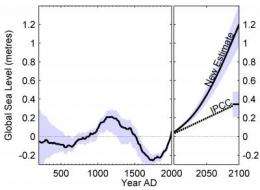Sea level rise of 1 meter within 100 years

New research indicates that the ocean could rise in the next 100 years to a meter higher than the current sea level - which is three times higher than predictions from the UN's Intergovernmental Panel on Climate Change, IPCC. The groundbreaking new results from an international collaboration between researchers from the Niels Bohr Institute at the University of Copenhagen, England and Finland are published in the scientific journal Climate Dynamics.
According to the UN's Intergovernmental Panel on Climate Change the global climate in the coming century will be 2-4 degrees warmer than today, but the ocean is much slower to warm up than the air and the large ice sheets on Greenland and Antarctica are also slower to melt. The great uncertainty in the calculation of the future rise in the sea level lies in the uncertainty over how quickly the ice sheets on land will melt and flow out to sea. The model predictions of the melting of the ice sheets are the basis for the Intergovernmental Panel on Climate Change's predictions for the rise in sea level are not capable of showing the rapid changes observed in recent years. The new research has therefore taken a different approach.
Looking at the direct correlation
"Instead of making calculations based on what one believes will happen with the melting of the ice sheets we have made calculations based on what has actually happened in the past. We have looked at the direct relationship between the global temperature and the sea level 2000 years into the past", explains Aslak Grinsted, who is a geophysicist at the Centre for Ice and Climate at the Niels Bohr Institute at the University of Copenhagen.
With the help of annual growth rings of trees and analysis from ice core borings researchers have been able to calculate the temperature for the global climate 2000 years back in time. For around 300 years the sea level has been closely observed in several places around the world and in addition to that there is historical knowledge of the sea level of the past in different places in the world.
By linking the two sets of information together Aslak Grinsted could see the relationship between temperature and sea level. For example, in the Middle Ages around 12th century there was a warm period where the sea level was approximately 20 cm higher than today and in the 18th century there was the 'little ice age', where the sea level was approximately 25 cm lower than it is today.
A rise in sea level in the future as in the past
Assuming that the climate in the coming century will be three degrees warmer, the new model predictions indicate that the ocean will rise between 0,9 and 1,3 meters. To rise so much so quickly means that the ice sheets will melt much faster than previously believed. But it has already been observed that the ice sheets react quicker to increases in temperature than experts thought just a few years ago. And studies from the ice age show that ice sheets can melt quickly. When the ice age ended 11.700 years ago, the ice sheets melted so quickly that sea level rose 11 millimeters per year - equivalent to a meter in 100 years. In the current situation with global warming, Aslak Grinsted believes, that the sea level will rise with the same speed - that is to say a meter in the span of the next 100 years.
Source: University of Copenhagen





















